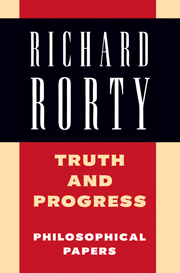Book contents
- Frontmatter
- Contents
- Introduction
- I Truth and Some Philosophers
- II Moral Progress: Toward More Inclusive Communities
- III The Role of Philosophy in Human Progress
- 13 The Historiography of Philosophy: Four Genres
- 14 The Contingency of Philosophical Problems: Michael Ayers on Locke
- 15 Dewey Between Hegel and Darwin
- 16 Habermas, Derrida, and the Functions of Philosophy
- 17 Derrida and the Philosophical Tradition
- Index
16 - Habermas, Derrida, and the Functions of Philosophy
Published online by Cambridge University Press: 06 July 2010
- Frontmatter
- Contents
- Introduction
- I Truth and Some Philosophers
- II Moral Progress: Toward More Inclusive Communities
- III The Role of Philosophy in Human Progress
- 13 The Historiography of Philosophy: Four Genres
- 14 The Contingency of Philosophical Problems: Michael Ayers on Locke
- 15 Dewey Between Hegel and Darwin
- 16 Habermas, Derrida, and the Functions of Philosophy
- 17 Derrida and the Philosophical Tradition
- Index
Summary
I think of Jacques Derrida as the most intriguing and ingenious of contemporary philosophers, and of Jürgen Habermas as the most socially useful – the one who does the most for social democratic politics. Admiring both men as I do, I should like to iron out some of the differences between them. In this essay, I want to examine Habermas's criticisms of Derrida in his Philosophical Discourse of Modernity and then go on to a discussion of Habermas's attempt to put philosophy in the service of human emancipation. My strategy will be to urge that Derrida and Habermas complement rather than oppose each other.
I argued in my Contingency, Irony, and Solidarity that Derrida's books are just what you need if you have been impressed and burdened by Heidegger – if you feel the power of Heideggerian language but want to avoid describing yourself in terms of it. A text like “Envois” (the initial section of Derrida's The Postcard) is an edifying account of how one reader of Heidegger wrestled with an overweening grandfather, and won. On the other hand, Habermas's Philosophical Discourse is just what you need if you find Heidegger and Derrida equally pointless. Habermas helps you feel justified in circumventing the Nietzsche–Heidegger–Derrida genre of ironist theorizing, in going around it rather than through it. If you remain unimpressed by Heidegger's litanies and Derrida's fantasies, Habermas gives you good reasons for saying that, at least for purposes of doing some public good, you can just ignore both.
Habermas sees Heidegger and Derrida as belonging to the tradition he calls “the philosophy of subjectivity,” which he traces back to Kant and Hegel.
- Type
- Chapter
- Information
- Truth and ProgressPhilosophical Papers, pp. 307 - 326Publisher: Cambridge University PressPrint publication year: 1998
- 6
- Cited by



